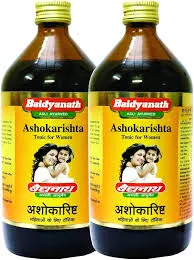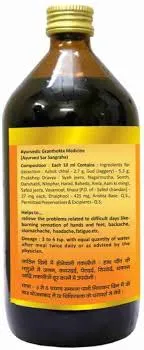




₹130 ₹165
Ashokarishta, also called Asokaristam, is a well-known Ayurvedic preparation. It is often used for the treatment of various women's health-related problems. It helps in the management of heavy menstrual bleeding called menorrhagia. It also helps in treating irregular, delayed or painful periods. It is also useful in managing bleeding piles and nose bleeds. Ashokarishta has rich properties which are helpful in the treatment of menopause-related symptoms. It also promotes the quality of life in menopausal women[1]. It contains a mix of ingredients that go through fermentation. The fermentation process helps this ayurvedic tonic gain some astringent properties. This property helps in controlling excessive menstrual bleeding, bleeding hemorrhoids, and bleeding ulcers. According to Ayurveda, mensuration-related problems are generally caused due to aggravation. Ashokarishta due to its Vata-balancing property helps to provide relief from menstruation-related disorders. It also has Kashaya (astringent) and Sita (cold) properties which help to control bleeding[2][3]. Its Sita property even helps in treating piles. It provides a considerable reduction in burning sensation and discomfort in piles. What is Ashokarishta made of? Ashoka, Dhataki, Cumin, Nagarmotha, Ginger, Daruharidra, Harad, Baheda, Amla, Mango, Adoosa, Sandalwood, Jaggery What are the synonyms of Ashokarishta? Ashokarishta syrup What is the source of Ashokarishta? Plant Based Benefits of Ashokarishta What are the benefits of Ashokarishta for Heavy menstrual bleeding? scientificModern Science View Generally, menstrual bleeding continues for 3-5 days, but if bleeding continues beyond this then this condition is called Menorrhagia. The presence of Ashok (Saraca asoca) bark as the main ingredient in Ashokarishta is considered to show astringent action, providing a halt in excessive menstrual bleeding[4]. Astringents act as a uterine tonic and help regulate the menses or period and the amount of flow. ayurvedicAyurvedic View According to Ayurveda, Menorrhagia is referred to as Rakta Pradar or excessive secretion of menstrual blood. This occurs due to an aggravation of Pitta dosha. Ashokarishta helps to manage menorrhagia due to its Pitta balancing and Kashaya (astringent) properties[2][3].